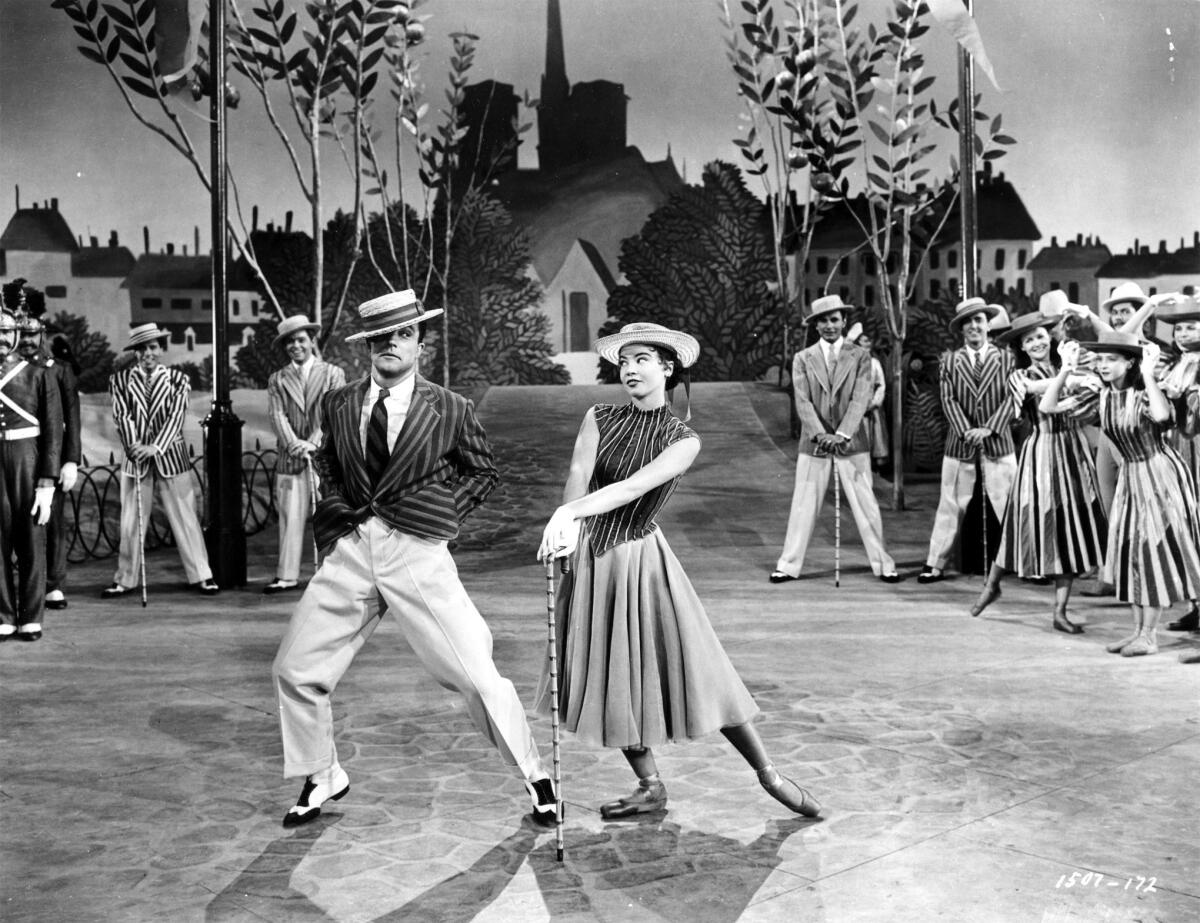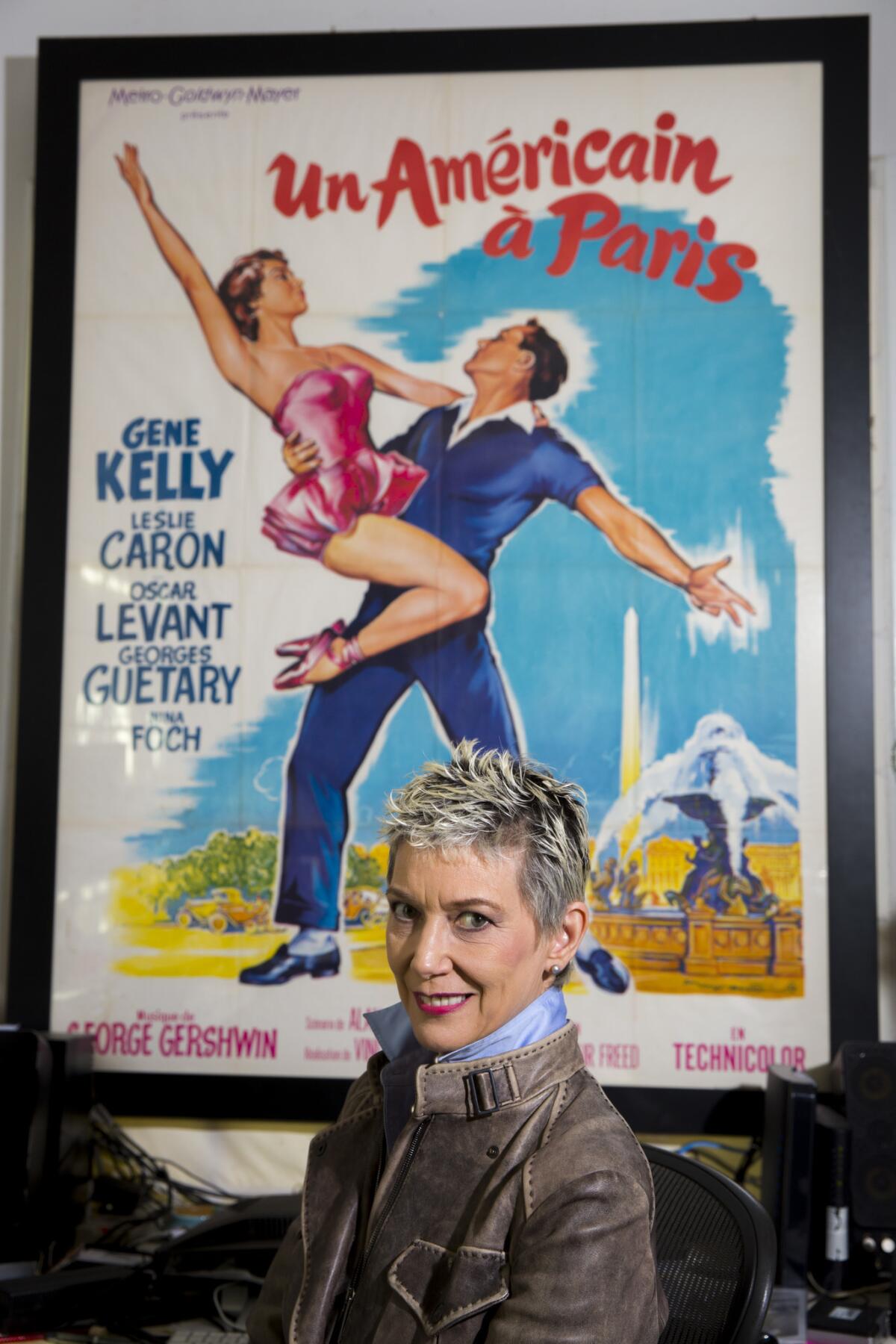Gene Kelly’s widow recalls magic of the film ‘An American in Paris’ as the stage version comes to SoCal
When Vincente Minnelli’s
As far back as 1944’s “Cover Girl,” Kelly had been expanding the language of dance on film as a choreographer. But Kelly took dance on film to another level with an exquisite, sexy, 17-minute-plus ballet sequence set to George Gershwin’s 1928 symphonic poem.
“An American in Paris” went on to win six Oscars including best film — beating out “A Streetcar Named Desire” and “A Place in the Sun” — and Kelly earned an honorary Academy Award as an “appreciation of his versatility as an actor, singer, director and dancer, and specifically for his brilliant achievements in the art of choreography on film.”
To this day, the late Kelly continues to inspire dancers, choreographers and directors such as Damien Chazelle (“La La Land”) and British ballet dancer Christopher Wheeldon, who saw the film as a child. Two years ago, Wheeldon won the Tony for his choreography (and was nominated for his direction) of an acclaimed musical version whose national tour opens March 22 at the Hollywood Pantages Theatre, just a few blocks from where the movie premiered 65 years ago.

SIGN UP for the free Essential Arts & Culture newsletter »
Patricia Ward Kelly, the widow of Gene, travels the world with her “Legacy” tour about her husband, who died in 1996.Gene Kelly hoped he could inspire young people to go out and create their own work, she said in a recent interview at her L.A. home, replete with photos, posters, his roller skates from the 1980 film “Xanadu” and his script for the 1952 masterpiece “Singin’ in the Rain.”

The original “An American in Paris” is a “gem” and “very much in its time,” Wheeldon said by phone from London, where the musical also is running. “It’s iconic and wonderful. There’s no replacement for Gene Kelly. There’s no replacement for Leslie Caron. That was not our intention to take the movie and just make a stage adaptation of the screenplay. So as a team, we were very sensitive to the fact that we were in a privileged position to be able to have the rights to do this show. I suppose the challenge then became: How do we take a stage version of ‘An American in Paris’ that doesn’t turn it back on the film?”
The plot still follows Alan Jay Lerner’s original script of the love affair between a happy-go-lucky former G.I. trying to make a living in Paris as a painter and a beautiful young Parisian named Lise. Craig Lucas’ book for the musical sets the story right after World War II, as the City of Light is trying to return to normalcy.
“In many ways, [the changes] makes the romance more potent because there is a contrast of the darkness and the light,” said Wheeldon, who visited with Patricia Kelly before production began. “She took me through the archive, so I got to see an original manuscript with Gene’s notes on it. I was looking at pages of music I would soon be interpreting with Gene notes.”
Many myths and legends have sprung up around “An American in Paris,” including the story that Cyd Charisse had been cast as Lise but left the project when she became pregnant.
“Gene tested two women,” Patricia Kelly said. “Odile Versois and Leslie Caron.”
Patricia Kelly opened a 1948 program from Les Ballets des Champs-Elysees, where her husband first saw Caron in “La Rencontre” as the Sphinx. “He went backstage to meet her and she had already gone home to bed. He remembered her and went back and tested her for the film.”
Gene Kelly and Minnelli, who worked together in the 1948 film “The Pirate,” put all of the numbers together. And they worked with Lerner, who sometimes got attacked for stories that didn’t have a lot of substance. But Gene said Lerner “was extraordinary in crafting the piece,” Patricia Kelly said.
When producer Arthur Freed said he wanted the 17½-minute ballet to be placed at the end of the film, she said, “Minnelli and Gene were like, ‘Oh no, people will get up and leave.’ But Freed insisted, and they went along with it.”
Still, a lot of people tried to talk Gene Kelly and Minnelli out of even having the ballet in the movie. “Seventeen minutes, all music, no words? I hope you know what you are doing, kid,” Irving Berlin told Gene.

“There was real pressure not to put it in,” Patricia Kelly said, “that people were saying, ‘Why jeopardize this? Why take this kind of risk?’”
But Gene knew the groundbreaking number was worth the risk.
Gene not only choreographed but directed the ballet sequence as a collaborative project. Instead of working out moves in a dance studio, he wrote down his ideas. “It all ran in a little screen in his head,” Patricia said. “He would go and put it on the dancers or on himself the next day.”
The rehearsal process was seven weeks. The lighting and the shooting of the sequence actually took less time — just four weeks.
The stage version audiences will see at the Pantages features not only a 14-minute “American in Paris” ballet, but also a dance opening prologue and some ballet at the end of Act I.
“I think what’s been so encouraging is that audiences who aren’t always exposed to dance or haven’t been exposed to ballet are responding to it positively,” Wheeldon said, “and connecting so well with the storytelling through dance.”
♦ ♦ ♦ ♦ ♦ ♦ ♦ ♦ ♦ ♦
‘An American in Paris’
When: March 22-April 9 at the Hollywood Pantages Theatre, 6233 Hollywood Blvd., L.A.; (800) 982-2787; www.hollywoodpantages.com. Also April 25-May 7 at Segerstrom Hall, Segerstrom Center for the Arts, 600 Town Center Drive, Costa Mesa; (714) 556-2787; www.scfta.org
Tickets: From $45 at the Pantages, from $29 at Segerstrom (both subject to change)
Follow The Times’ arts team @culturemonster.
ALSO
Spring preview: What to see in dance, theater, art, classical and more
'Fun Home' star and Actors' Equity President Kate Shindle's activist state of mind
Sex! Savagery! Singing! It's 'Game of Thrones' as musical parody
UPDATES:
For the Record
8 p.m. March 18: An earlier version of this article misstated the year Gene Kelly died. It was 1996, not 1995.
The biggest entertainment stories
Get our big stories about Hollywood, film, television, music, arts, culture and more right in your inbox as soon as they publish.
You may occasionally receive promotional content from the Los Angeles Times.








